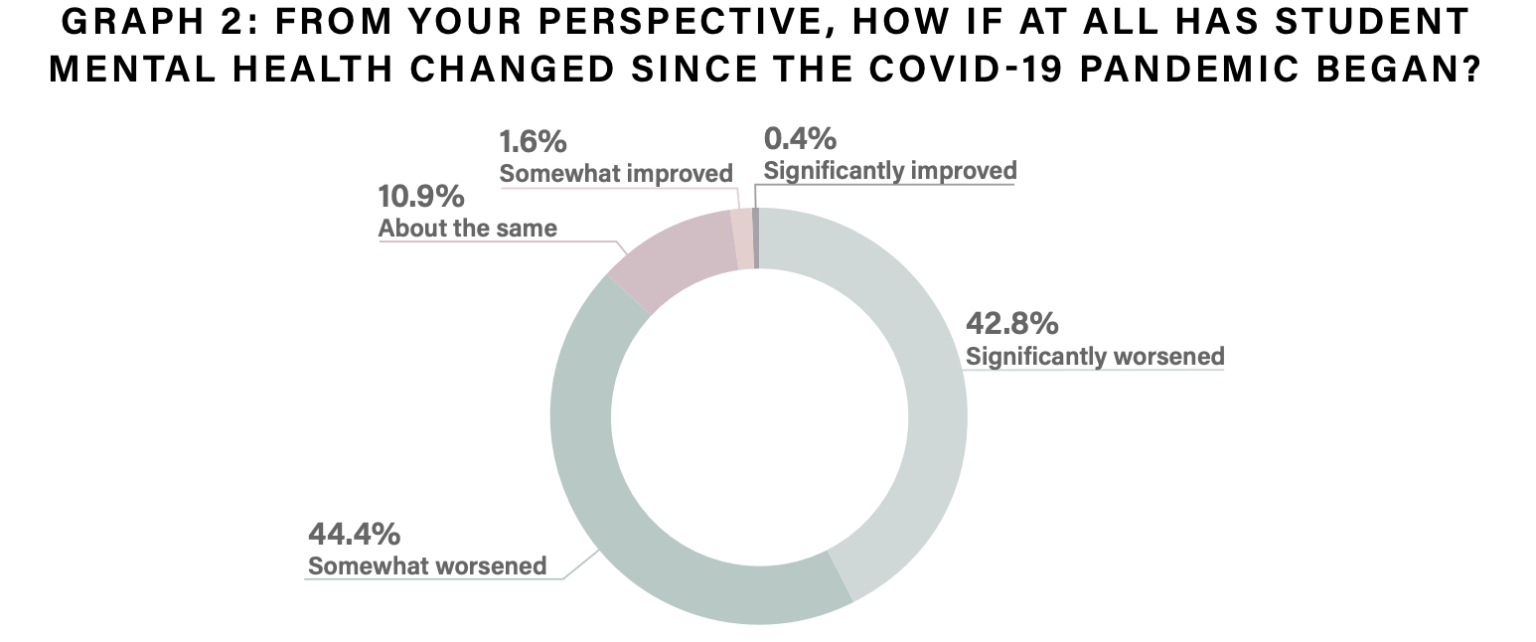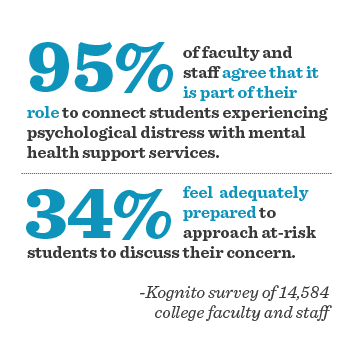New Survey Reveals Need for Faculty Mental Health Training
Campuses across the country are concerned about declining student mental health. A recent national survey reveals some surprising insights from those on the front lines: faculty and staff. These findings coincide with an upcoming relaunch of Kognito’s At-Risk for Faculty & Staff simulation. This evolution of our popular web-based faculty mental health training will better address today’s needs and will be available this summer — just in time to prepare for the 2021-2022 academic year.
Faculty members are increasingly playing an important role in addressing student mental health. Nearly 1,700 faculty members from colleges and universities of varying sizes were surveyed to help understand the faculty perspective on the current state of student mental and behavioral health. The survey was piloted by the Boston University School of Public Health (BUSPH) in partnership with the Mary Christie Foundation (MCF) and the Healthy Minds Network (HMN). Below is a summary of key findings that can help you better understand and serve your campus community. You can see the full report here.
Faculty are concerned about student mental health
A strong majority (87%) believe that student mental health has “worsened” or “significantly worsened” during the COVID-19 pandemic. This perception is highest in education, humanities, social science, and public policy faculty.
Faculty members have a view of students that campus mental health professionals don’t have access to. They see them in class (in-person or virtually) on a regular basis. Even in larger class sizes, they can see trends like class attendance and assignment performance. They have a “front row seat” in a way that other campus members don’t, and their concern about the mental health of their students should be taken seriously.

Faculty members are talking to students about mental health…
While some debate whether or not faculty should play a role in student mental health, findings from the survey make it clear that they already are.
Nearly 80% of faculty surveyed have had a one-on-one phone, video, or email conversations with students in the past 12 months regarding student mental health and wellness. Female faculty members, along with faculty affiliated with social sciences and public policy, education and humanities, the arts, and cross-disciplinary programs appear to be the most likely to have these conversations.
… but they’re not confident they’re approaching the right students

Only 51% of faculty reported that they have a good idea of how to recognize that a student is in emotional or mental distress. Male faculty members are the least confident.
Kognito’s At-Risk for Faculty & Staff simulation gives higher education faculty and staff the knowledge necessary to identify and refer students exhibiting symptoms of mental distress, including depression, anxiety, and thoughts of suicide.
Faculty mental health training is wanted and needed
Most faculty (73%) would welcome additional professional development on the topic of student mental health. In fact, 61% believe it should be mandatory that all faculty receive basic training in how to respond to students experiencing mental or emotional distress.
Specifically, the survey results indicate that faculty mental health gatekeeper training is needed, which is defined as “programs designed to enhance an individual’s skills to recognize signs of emotional distress in other people and refer them to appropriate resources.” Faculty and staff who complete Kognito’s At-Risk faculty mental health training significantly improve their ability to:
- identify when a student’s behavior or appearance is a sign of psychological distress,
- discuss concern with a student,
- motivate a student to seek help, and
- discuss a referral to mental health support services.
In Kognito’s whitepaper co-authored with JED, Are Campuses Ready to Support Students in Distress? our survey results also support the need for a mental health training program on campus directed towards faculty and staff.

For example, among the 14,584 faculty and staff who were surveyed, 95% agreed that connecting students with mental health support services is part of their role.
However, a much smaller percentage, 34%, actually felt adequately prepared to approach students to discuss their concern. Less than half felt adequately prepared to recommend mental health support services.
When asked which factors would encourage them to participate in faculty mental health training, survey respondents commonly cited that they would prefer training that is short, self-paced and online. Kognito’s research-based At-Risk for Faculty & Staff simulation is an interactive online training that can be completed anywhere, any time, in just 45 minutes.
Over 70% also said they would like faculty mental health training to include a list of mental health resources available at their institution. Throughout Kognito’s simulation, users have access to a printable summary and a web page that includes a list of specific mental health resources that is customized for your institution, and the upcoming relaunch features an expansion of support services examples.
Faculty’s perception of campus climate reveals there is work to do
Overall, 25% of faculty believe their institution is “hostile” or “somewhat hostile” toward students of color. This perception is significantly stronger for faculty members belonging to minority groups: 58% of Hispanic or Latinx faculty, 39% of Black or African American faculty, and 24% of Asian or Asian American faculty believe their institution is “hostile” or “somewhat hostile” toward students of color.
Marginalized communities have been disproportionately affected by the events that took place in 2020. We brought together psychologists, mental health experts, and a college student to weigh in on how campuses can best support their students during this pivotal time. Read this post for a summary of that insightful discussion.
The need to address student mental health is heightened. Counseling centers and campus mental health experts are important resources, but they require support from faculty and staff in order to help reach at-risk students. The bad news is that this new survey reveals gaps in knowledge and skills that faculty need to fill in order to have the greatest impact. The good news is that they want to learn, and Kognito’s At-Risk simulation is proven to help improve skills and lead to real behavior change.
Look for the relaunch of At-Risk for Faculty & Staff this summer. In the meantime, request a demo to experience the power of virtual simulation today.